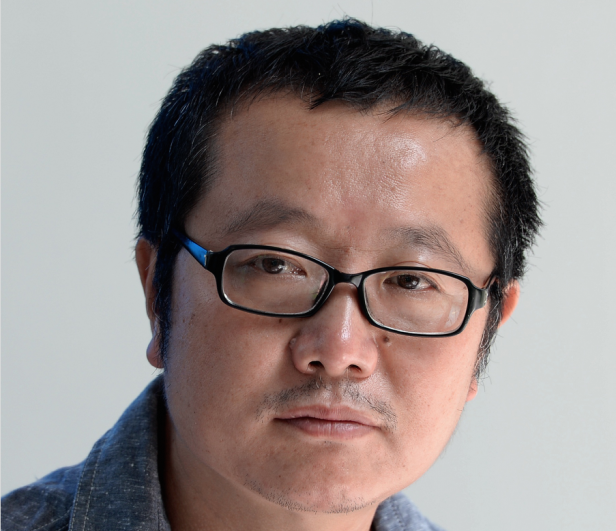When you think of science fiction in literature, you think of the greats like Isaac Asimov, Jules Verne and Frank Herbert. For Europe and North America, these are home-grown authors who are able to provide a sense of familiarity to their otherwise fantastical worlds built. Science fiction in China derives from these imported giants and for Cixin Liu, author of The Remembrance of Earth’s Past trilogy, it was always natural for him to have been inspired by these legends.
Liu seems adamant to remain a traditionalist, drawing on his passion for science fiction classics like 20,000 Leagues Under The Sea as one of the core reasons for his change in career path from a power plant engineer to a science-fiction author. He holds up his first edition signed Arthur C Clarke novel with great pride when we first meet him in London.
His first book in the trilogy, The Three-Body Problem, was a Hugo Award winner for Best Novel – the first translated novel to win the ward and also made Liu the first Chinese writer to win Best Novel in the prize’s sixty-year history. The last book in the series, Death’s End, was released in its translated form in September 2016, and The Three-Body Problem is now being made into a film and a game, too.
With that much praise to his belt, it would be easy to assume that there’d be a sense of well-deserved ego in Liu. Instead, Liu is evidently very modest and relaxed.
“I hold the Hugos very high in my mind,” he tells us through a translator. “It was unimaginable beforehand that I would even win, so I was very excited to hear that I had won! I had thought of the Hugos like a distant star, you can kind of see its light but it didn’t seem like anything to do with you. Now that I’ve won it, I’m still very excited.
“I’m also facing the whole thing with a very calm, ordinary mind, because when I was first writing sci-fi it was more for delivering my ideas to the audience and not aimed at winning any awards.”
His ideas would take four years of research alone for The Remembrance Of Earth’s Past trilogy, with orbital mechanics taking the full force of the science in The Three-Body Problem and the more philosophical concept of cosmic sociology driving the narrative in second book The Dark Forest.
“I’m not that prolific so I took time to shape things,” he admits. ”When I was writing, I couldn’t find many sources to help out [on the actual real-life discipline of cosmic sociology]. So in the large part, cosmic sociology came from my own imagination. I was not reflecting any scientific disciplines.”
Once the translated version of The Dark Forest launched, his American author friends sent him a plethora of academic papers on cosmic sociology, “Some of the things that came from the rigorous scientific research were actually way more compelling than what you can read of them in my novels!”
Generally categorised as hard sci-fi, The Remembrance Of Earth’s Past features plenty of technical and scientific research as well as mystery, romance and even thriller elements. Liu, however, describes it as “traditional sci-fi” from the “classical era”. He likens it to Campbell-era sci-fi that derived from the American author John W Campbell.
“This kind of creation process in America and China is sort of outdated though, as people start to crossbreed sci-fi,” he says. “But the success of The Three-Body Problem in China and the States tells me that this kind of method is still effective. The initial definition of sci-fi came from this original frame, so you can see that even today this kind of writing method is still relevant.”
With some of the earlier narrative incidents in the trilogy reflecting real-life historic events in China’s past, Liu cements a fraction of that same history in the minds of English-speaking audiences. The Three-Body Problem begins with a segment on the Cultural Revolution, though it wasn’t intentionally written to be drawn attention to as a matter of realism.
“I needed the female protagonist to lose faith totally in humanity. In the history of China, the recent history anyway, [the Cultural Revolution is] one single event that would make you disappointed in humanity. So it was not my intention to use the Cultural Revolution to reflect on reality, it was more that the story needed it as a backdrop and that’s why it was included.
“There is more commonality than differences between western and Chinese audiences. [But] there are still differences, for Western audiences [the Cultural Revolution] is new to them, something novel – just like all the Chinese elements in the story. Things like the Cultural Revolution is not entirely unfamiliar because historically there are events that are similar – like the Nazis and the Holocaust and the book Nineteen-Eighty Four: what transpires in that book kind of echoes with The Remembrance Of Earth’s Past trilogy.”
Looking towards the future and out of the past is an omnipresent theme throughout his books, so whilst Liu is busy working on the script for the film adaptation of The Three-Body Problem and providing input into the visual effects and concept design, he also has a bit of time to think about his next project. “I’ve got a lot of choices that I’m contemplating. One thing’s for sure my next piece of work will be very different to The Three-Body Problem.”
Death’s End is available to buy now, published by Head of Zeus. For all the latest book news, pick up the new issue of SciFiNow.
